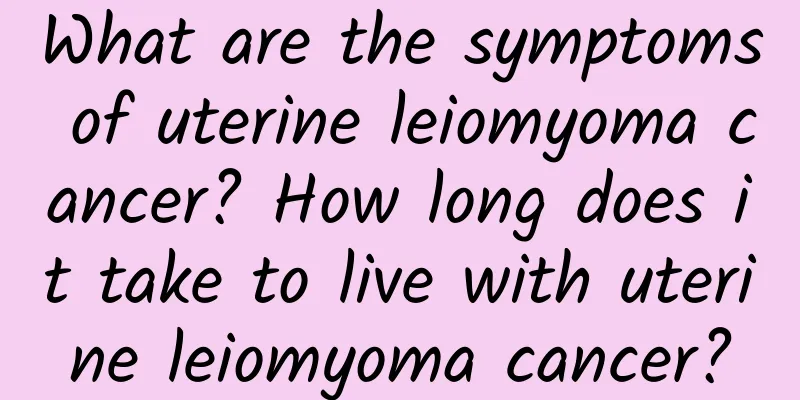What are the symptoms of uterine leiomyoma cancer? How long does it take to live with uterine leiomyoma cancer?

|
Uterine leiomyoma cancer is a rare, highly malignant tumor that originates in the smooth muscle cells of the uterus and has the ability to spread to other tissues and organs. Symptoms of this type of cancer are not specific and include: 1. Uterine bleeding: This is one of the most common symptoms of uterine leiomyoma cancer. Patients may experience abnormal uterine bleeding, whether or not it is during the regular menstrual cycle. Bleeding can be irregular, excessive, or last longer. 2. Pain: When the tumor expands and compresses nearby tissues or organs, the patient may feel abdominal pain or discomfort. This pain may be paroxysmal or continuous. 3. Pelvic mass: In some cases, patients may feel one or more masses in the pelvic area. The mass can be identified by palpation of the abdomen or through medical imaging. In addition to the above symptoms, patients may also experience other nonspecific symptoms such as fatigue, weight loss, abdominal bloating, etc. However, these symptoms are not definitive indicators of uterine leiomyoma cancer, as they may also be associated with other diseases. Regarding the popular science information about uterine leiomyoma cancer, first of all, we need to make it clear that uterine leiomyoma cancer is a rare type of cancer. Its incidence is much lower than that of uterine fibroids (a benign tumor) and other uterine cancers. Patients often have no symptoms, which often leads to a delay in diagnosis. However, especially when uterine bleeding is irregular and too frequent, or when patients have other unusual symptoms, doctors should consider the possibility of uterine leiomyoma cancer and conduct appropriate tests. As for the treatment of uterine leiomyoma cancer, due to the rarity and high malignancy of the disease, there is currently no definite cure. However, typical treatment options usually include surgical removal of the tumor, radiation therapy, and chemotherapy. Although uterine leiomyoma cancer is a relatively rare type of cancer, its symptoms, including uterine bleeding, painful sensations, and pelvic masses, should attract the attention of doctors. Early diagnosis and treatment are key to improving patient survival rates. Promoting public awareness and understanding of the disease will also help improve patients' quality of life and treatment outcomes. |
>>: What to eat to cure uterine fibroids quickly? What to eat to cure uterine fibroids quickly?
Recommend
Obesity is a chronic disease that brings many complications! This is how to lose weight after the Chinese New Year
The World Health Organization points out that &qu...
Refuse to "eat fat" after the New Year! Drink this fat-reducing tea before meals to prevent fat accumulation
According to the National Health Administration&#...
Daily precautions for cervical precancerous lesions
Patients with cervical precancerous lesions have ...
Which is more harmful, induced abortion or artificial abortion?
Which is more harmful, induced abortion or artifi...
Will my period be delayed if I take the emergency contraceptive pill? How long will my period be delayed if I take the contraceptive pill?
Will my period be delayed if I take emergency con...
Can eating spicy hotpot help you lose weight? Famous weight loss doctor: The fattest and most greasy ones are here...
In winter, people want to nourish themselves but ...
What should I pay attention to after uterine fibroid surgery? What is the best thing to eat after uterine fibroid surgery?
This sentence should be used for human health iss...
Will I die from cervical warts?
As people's minds become more open, the incid...
Natural pregnancy rate of chocolate cyst
Natural pregnancy rate of chocolate cyst After a ...
What should I do if I have cervical erosion? Is cervical erosion related to sexual life?
What should I do if I have cervical erosion? Is i...
What is the differential diagnosis of congenital absence of vagina?
In our lives, many people will have congenital ab...
What are the symptoms of chronic adnexitis?
What are the symptoms of chronic adnexitis? Chron...
How can you drink milk to supplement calcium correctly? Are there any taboos in drinking milk? Nutritionists teach you not to drink the wrong
Milk is rich in calcium, as well as high-quality ...
How can menopausal women supplement estrogen? It should be supplemented according to scientific methods
Normal estrogen has an important impact on women....
How much do you know about the precautions after an abortion?
What are the precautions after artificial abortio...









